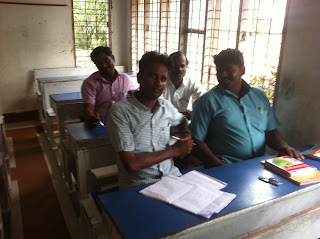http://pathway.org.in/
This time I am in the state called Tamil Nadu in India and have been completing various tasks while I’m here, primarily contributing to the development of a new volunteer program for Pathway School. I have spent most of my time at Pathway (and the farm), a school serving 200 orphans, which in India means destitute, having a single-parent, or having been abandoned by both parents. It has been made clear that priority goes to those who are the “poorest of the poor,” or students who would have never had an education or living quarters even slightly resembling what they have at Pathway. On campus there is also a special school serving 30 students with severe disabilities. The students there create beautiful crafts and works of art using recycled resources from the farm, while also attend special education classes, vocational classes, and physiotherapy sessions.
This time I am in the state called Tamil Nadu in India and have been completing various tasks while I’m here, primarily contributing to the development of a new volunteer program for Pathway School. I have spent most of my time at Pathway (and the farm), a school serving 200 orphans, which in India means destitute, having a single-parent, or having been abandoned by both parents. It has been made clear that priority goes to those who are the “poorest of the poor,” or students who would have never had an education or living quarters even slightly resembling what they have at Pathway. On campus there is also a special school serving 30 students with severe disabilities. The students there create beautiful crafts and works of art using recycled resources from the farm, while also attend special education classes, vocational classes, and physiotherapy sessions.
Pathway is a matriculated school, recognized by the
government as such, and has highly qualified teachers serving the children, all
of which have at least their bachelor’s degrees. The students at Pathway are following the
footsteps of their leaders, making plans to acquire college educations as well,
and some are planning to serve missions after college. They are ambitious, studious people who seem
to constantly be looking for ways to help lift burden.
I have had a more difficult time adjusting to the climate
and time change here than I did when I lived in Bylakuppe, Karnataka. It took only one good night’s rest for my
body to acclimate to the changes in Bylakuppe, and I was totally able to carry
on throughout the day just as I did in America.
Here I have trouble keeping my eyes open, even just at 12 in the
afternoon. The heat and humidity cause
gravity to wrestle my eyelids down at the most inopportune times, even while
attempting to teach a class. So far I
have taught seminary, English, and teacher trainings, and it seems I will
continue to do so for the remainder of my stay.
The children are very receptive, especially those that understand more
English than others, but the adults are even more receptive and learning at
monumental rates. The students participate
the best they can, though most of them are still shy at this point and testing
the waters of my behavior management system (of which I have no real formal
system…). The teachers and administrators sit intently
and furiously write notes, similar to the teachers I trained in Bangalore and
Bylakuppe. They ask several questions
showing their excitement and genuine interest in the topic, and always thank me
and express detailed sentiments regarding the gratitude they have at having
learned so much in such a short time.
Intrinsic motivation permeates the learning environments at Pathway.
The volunteer program is still in its early stages of
development, but after meeting with the board of directors I feel I’ve seen
definite promise. The program will be a
great asset to Pathway and will be a mutual benefactor between Pathway and
volunteers. I’m excited to be a part of
the program and make it strong and healthy.
That's it. I'm tired.




















